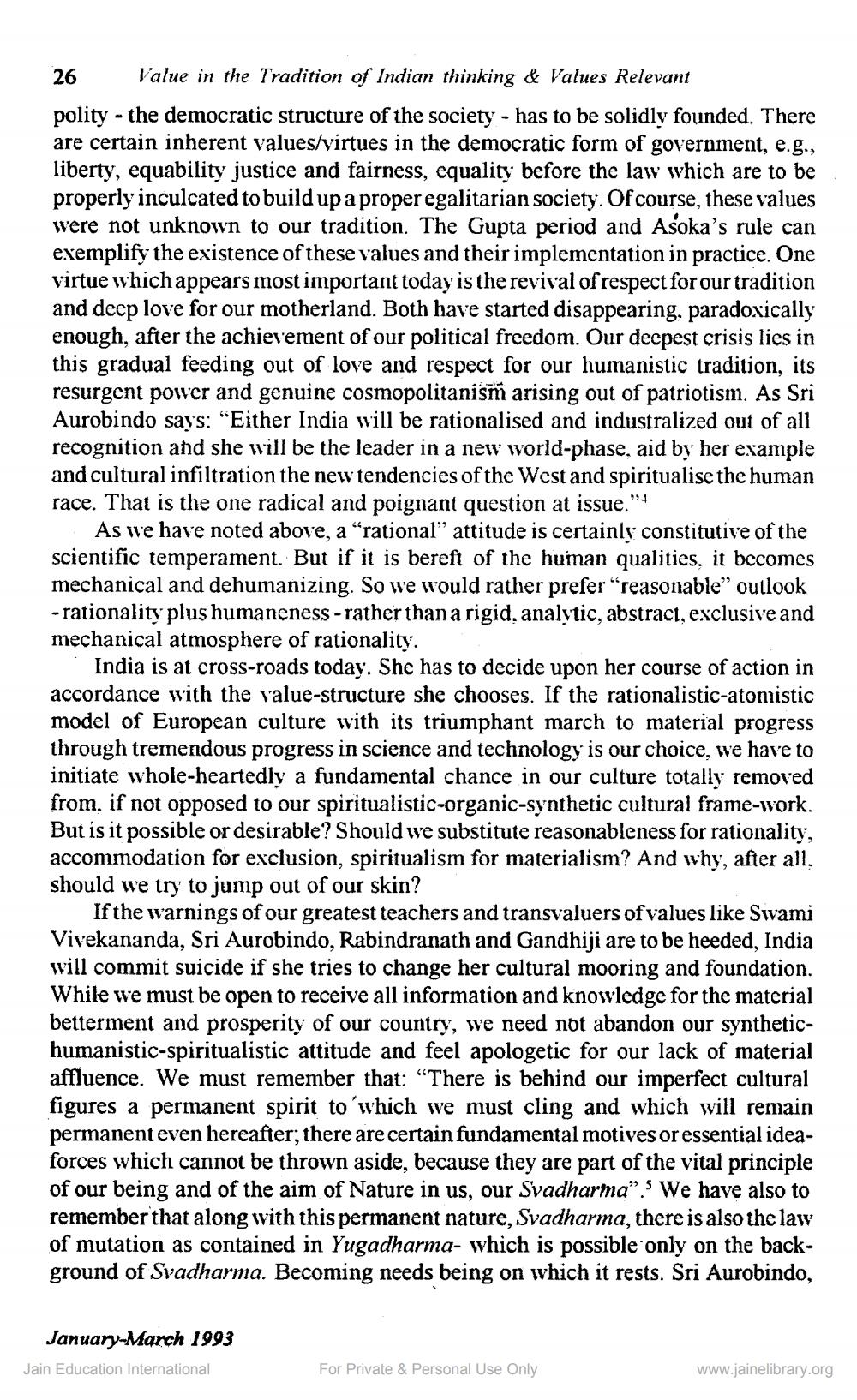________________
26
Value in the Tradition of Indian thinking & Values Relevant
polity - the democratic structure of the society - has to be solidly founded. There
inherent values/virtues in the democratic form of government, e.g., liberty, equability justice and fairness, equality before the law which are to be properly inculcated to build up a proper egalitarian society. Of course, these values were not unknown to our tradition. The Gupta period and Asoka's rule can exemplify the existence of these values and their implementation in practice. One virtue which appears most important today is the revival of respect for our tradition and deep love for our motherland. Both have started disappearing, paradoxically enough, after the achievement of our political freedom. Our deepest crisis lies in this gradual feeding out of love and respect for our humanistic tradition, its resurgent power and genuine cosmopolitanism arising out of patriotism. As Sri Aurobindo says: "Either India will be rationalised and industralized out of all recognition and she will be the leader in a new world-phase, aid by her example and cultural infiltration the new tendencies of the West and spiritualise the human race. That is the one radical and poignant question at issue."!
As we have noted above, a “rational" attitude is certainly constitutive of the scientific temperament. But if it is bereft of the human qualities, it becomes mechanical and dehumanizing. So we would rather prefer“reasonable” outlook - rationality plus humaneness - rather than a rigid, analytic, abstract, exclusive and mechanical atmosphere of rationality.
India is at cross-roads today. She has to decide upon her course of action in accordance with the value-structure she chooses. If the rationalistic-atomistic model of European culture with its triumphant march to material progress through tremendous progress in science and technology is our choice, we have to initiate whole-heartedly a fundamental chance in our culture totally removed from, if not opposed to our spiritualistic-organic-synthetic cultural frame-work. But is it possible or desirable? Should we substitute reasonableness for rationality, accommodation for exclusion, spiritualism for materialism? And why, after all. should we try to jump out of our skin?
If the warnings of our greatest teachers and transvaluers of values like Swami Vivekananda, Şri Aurobindo, Rabindranath and Gandhiji are to be heeded, India will commit suicide if she tries to change her cultural mooring and foundation. While we must be open to receive all information and knowledge for the material betterment and prosperity of our country, we need not abandon our synthetichumanistic-spiritualistic attitude and feel apologetic for our lack of material affluence. We must remember that: “There is behind our imperfect cultural figures a permanent spirit to'which we must cling and which will remain permanent even hereafter; there are certain fundamental motives or essential ideaforces which cannot be thrown aside, because they are part of the vital principle of our being and of the aim of Nature in us, our Svadharma”. We have also to remember that along with this permanent nature, Svadharma, there is also the law of mutation as contained in Yugadharma- which is possible only on the background of Svadharma. Becoming needs being on which it rests. Sri Aurobindo,
January-March 1993 Jain Education International
For Private & Personal Use Only
www.jainelibrary.org




